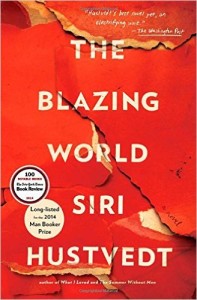 I’ve been reading The Blazing World, by Siri Hustvedt. I knew nothing about her, it was just a book that appeared on my list somehow. The novel is an intricate construction–written as if a study by a PhD researching Harriet (Harry) Burden, a fictional artist who has not been successful. The overlooked wife of an art dealer, she is passionate about her work. After her husband’s death, she conceives the idea showing her work as if created by three different men–she finds some willing partners–and each is more successful than the last.
I’ve been reading The Blazing World, by Siri Hustvedt. I knew nothing about her, it was just a book that appeared on my list somehow. The novel is an intricate construction–written as if a study by a PhD researching Harriet (Harry) Burden, a fictional artist who has not been successful. The overlooked wife of an art dealer, she is passionate about her work. After her husband’s death, she conceives the idea showing her work as if created by three different men–she finds some willing partners–and each is more successful than the last.
 The book consists of alleged interviews, notebook jottings, articles, and stories about this female artist (now deceased). Sound complicated? But it works! The writing and the thought behind the writing both intrigue me.
The book consists of alleged interviews, notebook jottings, articles, and stories about this female artist (now deceased). Sound complicated? But it works! The writing and the thought behind the writing both intrigue me.
This excerpt is from her fictional daughter talking about Harriet.
“My mother believed and I believe in really looking hard at things because, after a while what you see isn’t at all what you thought you were seeing a short time before. Looking at any person or object carefully means that it will become increasingly strange…”
This on a similar theme from Harriet’s notebooks:
“I forgot what I looked like. I forgot I had wrinkles, breasts that needed a mighty brassiere to hold them up, and a middle-aged gut that protruded like a melon. This amnesia is a phenomenology of the everyday—we don’t see ourselves—and what we see becomes us while we’re looking at it.”
And this on the reception or rejection of one’s work,which resonated for me!
“What did it mean that an amorphous they had celebrated her work when it arrived in a twenty-four-year old body with a cock, to borrow Harry’s words? What were the enthusiasts actually seeing, I asked, her work or just Anton, the portrait of the artist as a young hunk? How many people really looked at art? And if they did, could they see anything in it? How did people actually judge it? Since my interest ran more in the literary direction, I mentioned to Harry that Beckett’s Murphy had been rejected forty-three times and pointed to the many stories of literary journalists typing up manuscripts of celebrated novels, sending them off to publishers, and receiving standard rejection letters (or worse) in return. Without the aura of greatness, without the imprimatur of high culture, hipness, or celebrity, what remained? What was taste? Had there ever been a work of art that wasn’t laden with the expectations and prejudices of the viewer or reader or listener, however learned and refined?”
And a short take on revenge: “All thoughts of revenge are born of the pain of helplessness. I suffer becomes You will suffer. And let us not lie: Vengeance is invigorating. It focuses us and enlivens us, and it quashes grief because it turns the emotion outward.”
Although I’m not sure about the invigorating part–I think of Orwell’s wonderful essay “Revenge is Sour,” in which he posits that by the time you are in a position to exact revenge, it’s meaningless. You can read this online. But you’ll have to get yourself a copy of The Blazing World.